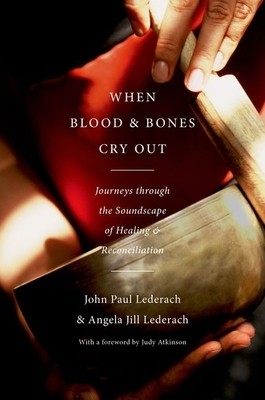
- We will send in 10–14 business days.
- Author: John Paul Lederach
- Publisher: Oxford University Press, USA
- ISBN-10: 0199837104
- ISBN-13: 9780199837106
- Format: 15.8 x 23.6 x 3.1 cm, hardcover
- Language: English
- SAVE -10% with code: EXTRA
Reviews
Description
Around the world communities that have suffered the trauma of unspeakable violence--in Liberia, Somalia, West Africa, Columbia, and elsewhere--are struggling to recover and reconcile, searching for ways not just to survive but to heal.
In When Blood and Bones Cry Out, John Paul Lederach, a pioneer of peace-building, and his daughter, Angela Jill Lederach, show how communities can recover and reconnect through the power of making music, creating metaphors, and telling their extraordinary stories of suffering and survival. Instead of relying on more common linear explanations of healing and reconciliation, the Lederachs demonstrate how healing is circular, dynamic, and continuing, even in the midst of ongoing violence. They explore the concept of "social healing," a profoundly important intermediary step between active warfare and reconciliation. Social healing focuses on the lived experience of those who have suffered protracted violence and their need to give voice to that experience, both individually and collectively. Giving voice, speaking the unspeakable, in words and sounds that echo throughout traumatized communities, can have enormous healing power. Indeed, the Lederachs stress the remarkable effects of soundand vibration through tales of Tibetan singing bowls, Van Morrison's transcendent lyrics, the voices of mothers in West Africa, and their own personal journeys. And they include inspiring stories of transformation: a mass women's protest movement in Liberia that forces leaders to keep negotiating until a peace agreement is signed; elders in Somalia who walk between warring clans year after year to encourage dialogue; former child soldiers who run drum workshops and grow gardens in refugee camps; and rape victims in Sierra Leone who express their pain in poetry. With equal measures of insight and compassion, When Blood and Bones Cry Out offers a promising new approach to healing traumatized communities.
EXTRA 10 % discount with code: EXTRA
The promotion ends in 19d.23:17:09
The discount code is valid when purchasing from 10 €. Discounts do not stack.
- Author: John Paul Lederach
- Publisher: Oxford University Press, USA
- ISBN-10: 0199837104
- ISBN-13: 9780199837106
- Format: 15.8 x 23.6 x 3.1 cm, hardcover
- Language: English English
Around the world communities that have suffered the trauma of unspeakable violence--in Liberia, Somalia, West Africa, Columbia, and elsewhere--are struggling to recover and reconcile, searching for ways not just to survive but to heal.
In When Blood and Bones Cry Out, John Paul Lederach, a pioneer of peace-building, and his daughter, Angela Jill Lederach, show how communities can recover and reconnect through the power of making music, creating metaphors, and telling their extraordinary stories of suffering and survival. Instead of relying on more common linear explanations of healing and reconciliation, the Lederachs demonstrate how healing is circular, dynamic, and continuing, even in the midst of ongoing violence. They explore the concept of "social healing," a profoundly important intermediary step between active warfare and reconciliation. Social healing focuses on the lived experience of those who have suffered protracted violence and their need to give voice to that experience, both individually and collectively. Giving voice, speaking the unspeakable, in words and sounds that echo throughout traumatized communities, can have enormous healing power. Indeed, the Lederachs stress the remarkable effects of soundand vibration through tales of Tibetan singing bowls, Van Morrison's transcendent lyrics, the voices of mothers in West Africa, and their own personal journeys. And they include inspiring stories of transformation: a mass women's protest movement in Liberia that forces leaders to keep negotiating until a peace agreement is signed; elders in Somalia who walk between warring clans year after year to encourage dialogue; former child soldiers who run drum workshops and grow gardens in refugee camps; and rape victims in Sierra Leone who express their pain in poetry. With equal measures of insight and compassion, When Blood and Bones Cry Out offers a promising new approach to healing traumatized communities.


Reviews